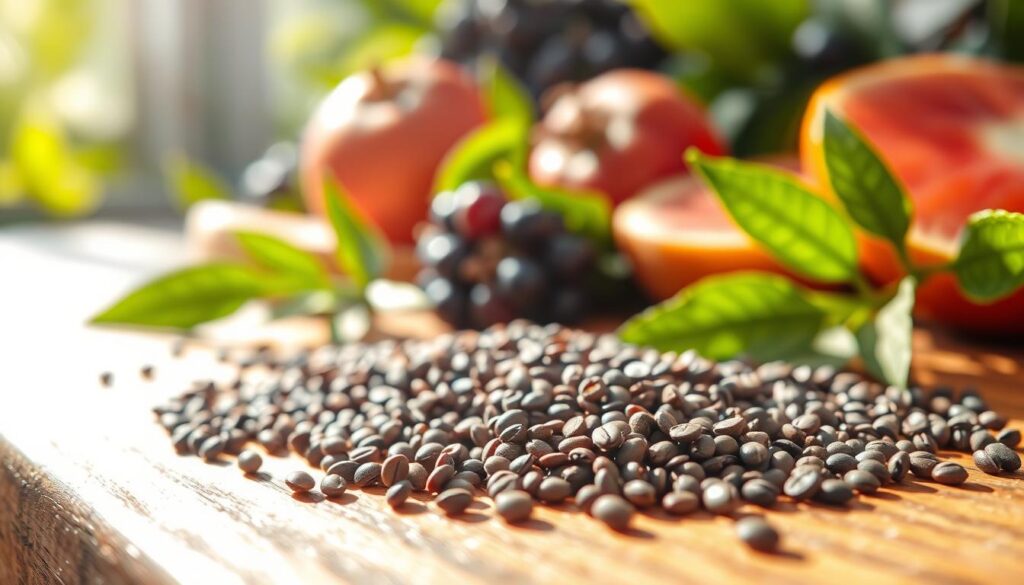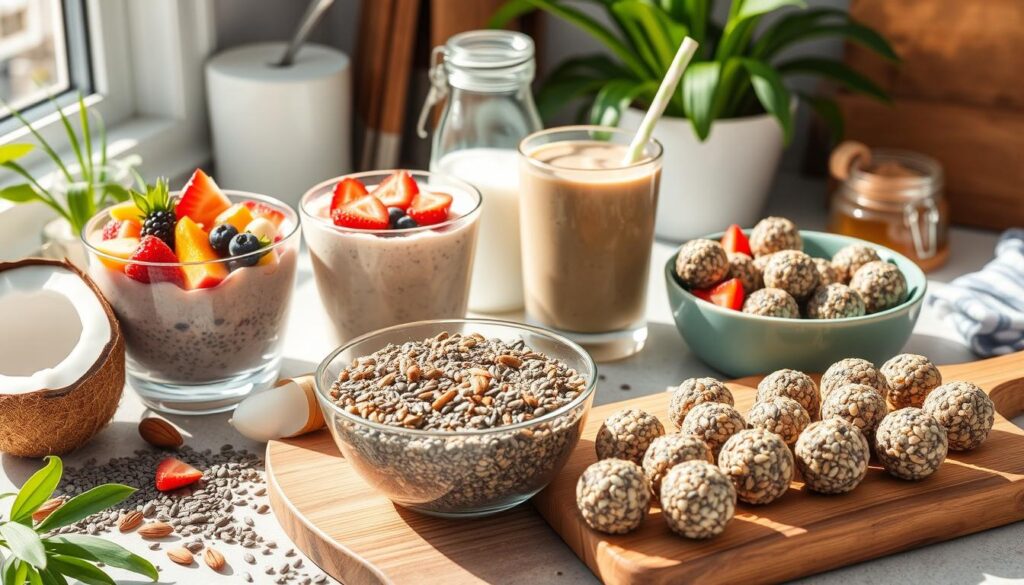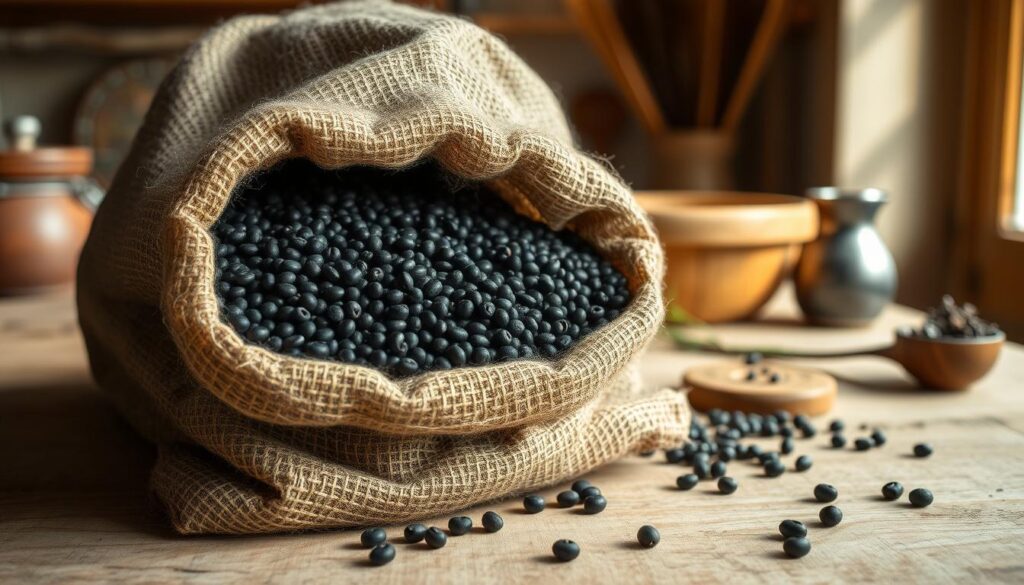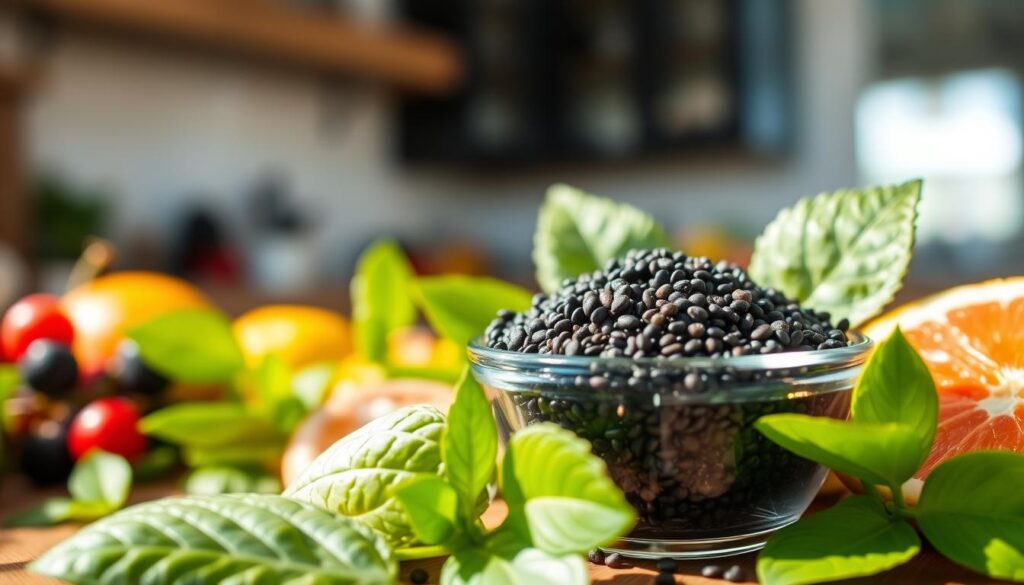When I add chia seeds to my morning smoothie bowl, I’m amazed by their nutritional power. I started using chia seeds to boost my energy and health. Now, they’re a key part of my diet, offering many health benefits that have changed my life.
Chia seeds were a key food for ancient Aztec and Maya people. Today, they’re back in the spotlight for their nutritional value and kitchen versatility. Let’s explore why these tiny seeds are so popular with health enthusiasts in India and around the world.
Chia seeds are great for heart health and weight management. They’re also good for increasing protein, balancing omega-3 fatty acids, or adding fiber to your meals. Join us as we discover the amazing benefits of chia seeds for a healthier life.
Key Takeaways
- Chia seeds are nutrient-dense superfoods packed with fiber, protein, and omega-3 fatty acids.
- Just one ounce (28g) of chia seeds provides 138 calories and 4.7g of protein.
- These tiny seeds are rich in antioxidants that may protect heart and liver health.
- Chia seeds contain 35% fiber by weight, which may aid in weight loss efforts.
- The high calcium, phosphorus, and magnesium content in chia seeds supports bone health.
- Incorporating chia seeds into your diet is simple and versatile.
Introduction to Chia Seeds
Chia seeds are tiny but packed with nutrition. They have a long history that goes back thousands of years. These small oval seeds are gray with black and white spots, measuring about 2 millimeters in diameter.
Recently, they’ve become popular as a modern superfood. But their history goes way back to ancient times.
History and Origin
The Aztec and Maya civilizations loved chia seeds for their amazing qualities. They used them not just for eating, but also for medicine, religious rituals, and beauty products. These seeds were a key part of their diet and culture.
Superfood Status
Now, chia seeds are known as a superfood. They are tiny but powerful. In every 100 grams, you’ll find 486 kcal, 42.1 grams of carbs, 30.7 grams of fat, and 16.5 grams of protein.
They are also full of dietary fiber, offering 34.4 grams per 100 grams. Chia seeds are packed with essential minerals too. You’ll get 631 mg of calcium, 7.7 mg of iron, 335 mg of magnesium, and 860 mg of phosphorus in every 100 grams.
Chia seeds can absorb up to 12 times their weight in liquid. This makes them versatile in cooking and baking. From ancient times to today, chia seeds have always been a nutritional powerhouse.
Nutritional Profile of Chia Seeds
Chia seeds are tiny but mighty, full of essential nutrients. They are a favorite among health enthusiasts. Let’s explore the amazing nutritional benefits of chia seeds.
One ounce (28 grams) of chia seeds has 138 calories. They are made up of 46% carbohydrates, 34% fat, and 19% protein. They also have 11 grams of fiber, which is a big part of the daily need for both men and women.
Chia seeds are a great source of protein, with 4.7 grams per ounce. This is especially good for vegetarians and vegans. The fat in them is mostly omega-3 fatty acids, with 75% being alpha-linolenic acid (ALA).
| Nutrient | Amount per ounce (28g) | % Daily Value |
|---|---|---|
| Fiber | 9.8g | 39% (women), 25% (men) |
| Protein | 4.7g | 9% |
| Omega-3 (ALA) | 5g | 312% |
| Calcium | 179mg | 14% |
| Iron | 2.2mg | 12% |
| Magnesium | 95mg | 23% |
Chia seeds are full of important minerals. They give you 14% of the daily calcium, 12% of iron, and 23% of magnesium. They also have phosphorus, zinc, vitamins B1 and B3, making them a nutrient-rich food.
Chia seeds are loaded with antioxidants. They have chlorogenic acid, caffeic acid, quercetin, and kaempferol. These antioxidants help with health and make chia seeds a superfood.
Health Benefits of Chia Seeds
Chia seeds are packed with health benefits. They are small but mighty, supporting your heart, aiding in weight loss, and more.
Heart Health
Chia seeds are great for your heart. Studies in 2021 showed they boost HDL cholesterol and lower LDL cholesterol. This balance is key for a healthy heart and lowers heart disease risk.
Weight Management
Chia seeds can help with weight loss. A 2017 study found they made people feel full and cut calorie intake when added to yogurt. With 138 calories and 4.7 grams of protein per ounce, they keep you satisfied and support weight loss.
Blood Sugar Regulation
Chia seeds are good for managing diabetes. A 2018 review showed they lowered blood sugar and insulin levels in diabetics and non-diabetics. Their high fiber content, 9.8 grams per ounce, is key to this benefit.
Digestive Health
Chia seeds are great for your gut. Just one ounce gives you 35% of the daily fiber needed, helping with digestion and regular bowel movements. This fiber supports a healthy gut microbiome.
| Nutrient | Amount per 1 oz (28g) | % Daily Value |
|---|---|---|
| Calories | 138 | – |
| Protein | 4.7g | 9% |
| Fat | 8.7g | 13% |
| Carbohydrates | 12g | 4% |
| Fiber | 9.8g | 35% |
But, eating too much chia seed can cause digestive problems or dehydration because of its high fiber. Always eat in moderation when trying new foods.
Chia Seeds as a Source of Plant-Based Protein
Chia seeds are a great choice for those who want vegan protein. They have almost 5 grams of protein in just two tablespoons. This makes them perfect for vegetarians and vegans needing protein.
Chia seeds help with many body functions. They fix muscles, boost the immune system, and keep skin, hair, and nails healthy. They also help with weight control by keeping you full longer.
| Nutrient | Amount per 28g (2 tbsp) |
|---|---|
| Calories | 138 |
| Protein | 5g |
| Dietary Fiber | 10g |
| Total Fat | 9g |
Chia seeds are full of nutrients besides protein. They have lots of fiber, which is good for your gut and helps with regular bowel movements. They also have important minerals like calcium, iron, magnesium, and zinc, which are good for your health.
Chia seeds are easy to find in India for those wanting to add them to their diet. They cost between ₹67.50 and ₹220.00 per 100g, with an average price of ₹207.49. You can buy them in sizes from 125g to 1kg, so there’s something for everyone.
Omega-3 Fatty Acids in Chia Seeds
Chia seeds are a great source of plant-based omega-3 fatty acids. They are small but powerful, especially when it comes to alpha-linolenic acid (ALA). ALA is a type of omega-3 that is key for heart health. Just one ounce (28 grams) of chia seeds gives you 5,000 mg of ALA. This is more than the daily amount recommended for both men and women.
Importance of ALA in Diet
ALA is vital for keeping your heart healthy. It lowers bad cholesterol, blood pressure, and reduces the risk of heart disease. The American Heart Association suggests eating foods rich in omega-3 often. This is especially true for people with heart conditions.
Comparison with Other Omega-3 Sources
Chia seeds are better than many other plant-based sources of omega-3. While flaxseed oil has the most ALA at 7.26 grams per tablespoon, chia seeds have 2.53 grams per tablespoon. They are a great choice for those eating plant-based or wanting to increase their omega-3 intake.
| Source | ALA Omega-3 (per tablespoon) |
|---|---|
| Flaxseed Oil | 7.26 g |
| Chia Seeds | 2.53 g |
| Canola Oil | 1.28 g |
| Walnuts | 1.28 g |
Adding chia seeds to your meals is a simple way to get more omega-3. You can sprinkle them on yogurt, blend them into smoothies, or use them in baking. These versatile seeds are a tasty and easy way to support heart health with plant-based omega-3s.
Antioxidants and Their Role in Chia Seeds
Chia seeds are a powerhouse against free radicals and oxidative stress. They are full of antioxidants that help fight aging and prevent diseases.
Chia seeds have a lot of antioxidants. They have chlorogenic acid, caffeic acid, myricetin, quercetin, and kaempferol. These help keep the seeds fresh and are good for our health.

Studies show that chia seeds are rich in polyphenols, strong antioxidants. These fight off free radicals that can harm cells and lead to chronic diseases.
“Chia seeds are a superfood with remarkable antioxidant properties that can support overall health and well-being.”
Chia seeds’ antioxidants can protect the heart and liver. They reduce inflammation and stress, which may lower the risk of cancer and heart disease.
| Antioxidant | Amount (per kg of seed) | Potential Benefits |
|---|---|---|
| Chlorogenic acid | 7.1 × 10−4 mol | Anti-inflammatory, blood sugar regulation |
| Caffeic acid | 1.35 × 10−2 mol | Antioxidant, anti-carcinogenic |
| Kaempferol | 1.1 × 10−3 mol | Cardioprotective, anti-inflammatory |
| Quercetin | 2.0 × 10−4 mol | Antihistamine, anti-inflammatory |
| Myricetin | 3.1 × 10−3 mol | Antioxidant, anti-diabetic |
Eating chia seeds can help your body fight oxidative stress and support your health.
Chia Seeds for Bone Health
Chia seeds are a powerhouse for bone health. They are full of minerals that help keep our bones strong. Let’s explore how chia seeds can help prevent osteoporosis.
Calcium Content
Chia seeds are loaded with calcium, a key mineral for bone health. Just one ounce gives you about 18% of the daily calcium you need. This makes them a great option for those who don’t like dairy.
Other Bone-Boosting Minerals
Chia seeds also have phosphorus and magnesium, important for bones. These minerals help make bones strong and dense. They can help prevent osteoporosis.
| Mineral | Amount per 100g of Chia Seeds | Benefits for Bone Health |
|---|---|---|
| Calcium | 631 mg | Essential for bone structure and strength |
| Phosphorus | 860 mg | Aids in forming bone mineral matrix |
| Magnesium | 335 mg | Supports bone mineralization |
A study by Valdivia-López et al. in 2015 showed that chia seeds are good for bone health. Adding chia seeds to your meals can help support your bones and lower the risk of osteoporosis.
Incorporating Chia Seeds into Your Diet
Chia seeds are tiny powerhouses that can make your meals better. They are full of nutrients, making them great for many dishes. Let’s look at tasty ways to add chia seeds to your meals and find out how much you should eat daily.
Chia Seed Recipes
Chia pudding is a simple and popular treat. Mix 1/4 cup of chia seeds with 1 cup of milk, add your favorite sweetener, and chill overnight. You get a creamy, nutritious dessert. For a cool drink, soak 1/4 cup of seeds in 4 cups of water for 20-30 minutes.
Adding chia seeds to smoothies makes them better. Just put a tablespoon in your favorite mix for more nutrition and texture. If you’re baking, use chia seeds as an egg substitute. Mix 1 tablespoon of seeds with 3 tablespoons of water to replace one egg in recipes.

Recommended Daily Intake
A good daily amount of chia seeds is about 1 ounce or 2-3 tablespoons. This gives you 10 grams of fiber, 5 grams of protein, and only 138 calories. Start with a little and increase as you get used to it to avoid stomach issues.
| Chia Seed Use | Amount | Benefit |
|---|---|---|
| Chia Pudding | 1/4 cup | Creamy texture, high fiber |
| Smoothies | 1 tablespoon | Added nutrients, thicker consistency |
| Baking (egg substitute) | 1 tablespoon + 3 tbsp water | Replaces 1 egg, adds moisture |
| Daily Intake | 1 ounce (2-3 tablespoons) | 10g fiber, 5g protein, 138 calories |
Adding chia seeds to your diet is easy and rewarding. Whether you’re making chia pudding, blending smoothies, or baking, these tiny seeds can greatly improve your health. Just remember to eat the right amount each day to enjoy the best benefits without any problems.
Potential Side Effects and Precautions
Chia seeds are full of nutrients but might not be good for everyone. Some folks might get bloated if they eat too much. It’s important to drink plenty of water to avoid stomach trouble.
People with allergies should be careful. Chia seeds can cause allergic reactions, especially in those allergic to sesame. If you’re allergic to seeds, talk to a doctor before eating chia.
Chia seeds can also affect certain medicines. If you’re on blood thinners or blood pressure drugs, speak with your doctor. Chia seeds are high in fiber, which might change blood sugar levels. Diabetics should watch how much they eat.
To make digestion easier, soak chia seeds before eating or use ground seeds. If chia doesn’t work for you, try flaxseed instead. It has similar benefits. Always start with a small amount when trying new foods.
FAQ
What are chia seeds?
Chia seeds are tiny black or white seeds from the Salvia hispanica L. plant. They come from Central America. In ancient Aztec and Maya diets, they were a key food. Now, they’re seen as a superfood full of nutrients.
What are the nutritional benefits of chia seeds?
Chia seeds are packed with fiber, protein, omega-3 fatty acids (ALA), calcium, iron, magnesium, and antioxidants. They offer a lot of essential nutrients in a small amount.
How can chia seeds benefit heart health?
Chia seeds’ fiber and omega-3 can help lower cholesterol and cut heart disease risk. Their ALA also helps by reducing blood pressure.
Can chia seeds aid in weight management?
Yes, chia seeds’ protein and fiber can make you feel full, helping with weight control. They’re also nutrient-dense, making them great for weight loss diets.
Are chia seeds a good source of plant-based protein?
Absolutely, chia seeds are a top plant-based protein source. They have all nine essential amino acids, making them perfect for vegetarians and vegans.
How do chia seeds compare to other omega-3 sources?
Chia seeds are a top choice for plant-based omega-3, with more ALA than many other options. They’re also easy to add to many dishes.
What are the benefits of antioxidants in chia seeds?
Chia seeds are full of antioxidants like chlorogenic acid and quercetin. These can fight free radicals, reduce oxidative stress, and lower the risk of chronic diseases like cancer.
How can chia seeds support bone health?
Chia seeds are loaded with calcium, phosphorus, and magnesium, key for strong bones. Their ALA may also help bone health.
How can I incorporate chia seeds into my diet?
Chia seeds are versatile and can be added to oatmeal, puddings, smoothies, and baked goods. They can also be used as an egg substitute or to thicken sauces. Aim for one ounce (28g or 2-3 tablespoons) daily.
Are there any potential side effects or precautions with chia seeds?
Eating too much chia seed can cause bloating or diarrhea if you’re not drinking enough water. They might affect blood thinners and blood pressure meds. Be careful if you have seed allergies.

